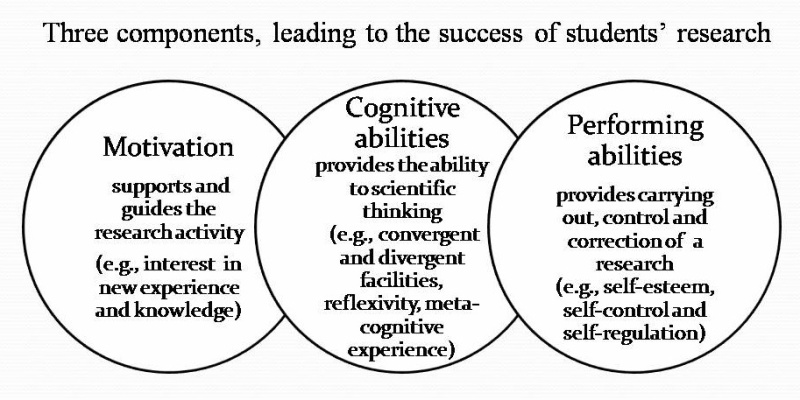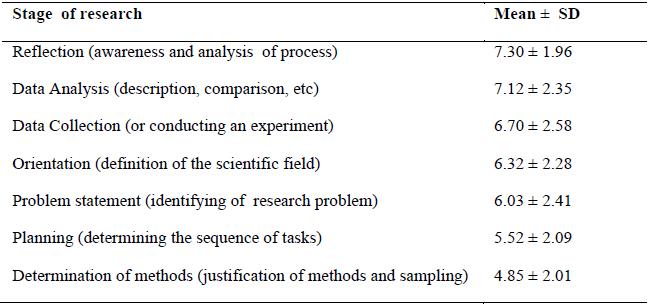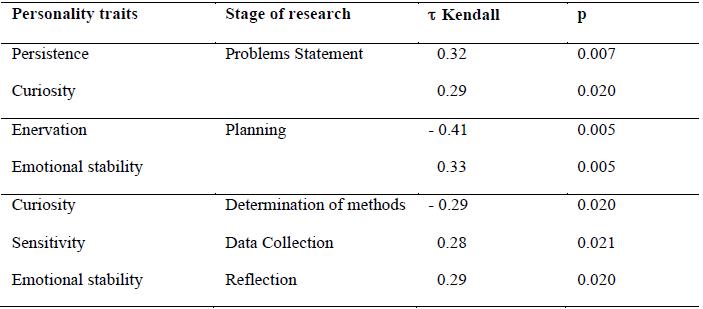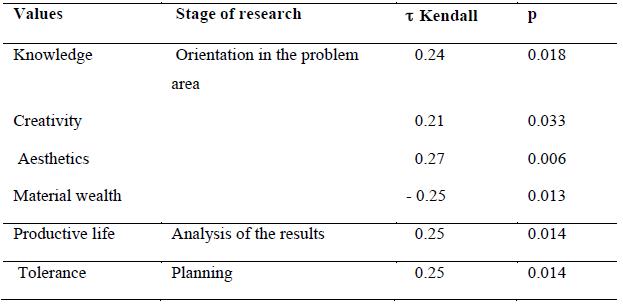Abstract
The contribution of students' cognitive features and motivation to ensuring their research achievements is sufficiently defined but the role of their subjective representations and personality characteristics is not studied enough. The study posed the questions: are there distinctions in students' attitudes toward different stages of a research work; what personality traits and values lead to preferences or underestimation of certain stages of a research? Questionnaire for students with seven 10-point scales for the assessment of different stages of research, The Big Five Personality Test (5PFQ), Rokeach Value Survey (RVS), mathematical methods (descriptive analysis, Kendall correlation coefficient, and Mann–Whitney U test) were applied to evaluate the study objectives. The sample consisted of 75 4th year students of St. Petersburg State University (mean age 22.9±1.3). The study revealed the ambivalent attitude of students to the stages of scientific work involves planning of tasks, problem statement and selection of methods and techniques, and also influence of students’ personality features on preference for certain types of scientific activity. There were found multiple correlations between students’ personality traits (persistence, curiosity, emotional stability, and sensitivity), students’ values (knowledge, creativity, tolerance, productivity) and their attitudes toward research activity.
Keywords: Studentstudent’s researchpersonalityvalues
Introduction
Students’ research is an essential part of modern university education, but the fulfillment of research
is one of the significant problems for students (Doygun & Gulec, 2012), related to their low readiness
to engage in research and insufficient representations of its content. This study is the continuation of
the series of our investigations devoted to studying the implementation of research potential of the
person during the learning at the University (Kostromina et al., 2014). Why do we study personal
features of students involved in scientific work during learning and preparing for future professional
work?
Firstly, students’ involvement in scientific search and experimenting is one of main conditions of
better quality of modern professional training and realization of students’ personal potential. Secondly,
while conducting a research the personality organizes its own activity and adapts its own individual
features to specific tasks because of what the research activity of the student acquires peculiar quality
characteristics. Thirdly, it is seen from the study of personal features of great scientists that the ability
to research is determined largely by personality and its values, not only the intellect.
Psychologically, student’s research activity:
is a type of active cognitive and intellectual creativity of students (experimental or theoretical),
directed to searching and obtaining new knowledge, conducted according to logic and basic stages of scientific study, and performed as a qualifying work in accordance with accepted requirements.
For a long time research achievements of students were associated with certain abilities. But as do
we know it is important not only to be able to research, but also to have the desire to conduct the
research and be able to organize and direct its own activity. Thus, in general, there are motivational,
cognitive, and behavioral features, which can be required and used for solving the research tasks and
can be defined as
research activities and demonstrates itself in solving of various types of scientific problems
(Kostromina et al., 2014).
There are three components, leading to the success of students’ research (

Motivational component starts, supports, and guides the research activity; it includes different
motives, for example, interest in new experience and knowledge; pleasure of the research process; need
for self-development; desire for recognition and so on. Cognitive component provides the ability to
scientific thinking (for example, convergent and divergent facilities, reflexivity, meta-cognitive
experience, intellect and creative abilities, in particular, the sensitivity to the contradictions, the
originality of thinking, the ability to ask questions, to make hypotheses, intolerant attitude to the
uncertainty, scientific reasoning abilities, etc). Performing/behavioral component is a system of self-
esteem, self-control and self-regulation which provides a personality control of research, evaluation of
results and correction of further studies.
Problem statement
Many studies have been devoted to the identification of the factors leading to the success of the
students' research; on the base of a review of many investigations it was defined a substantial
contribution of students’ cognitive features and motivation (Sedaghat et al., 2011). But equally
important are the personal characteristics of students ensuring achievement of the required results at
every stage of research.
The personal features of outstanding scientists has been studied, and a number of their personal
traits were identified, for example, skepticism and criticism, ego-strength, emotional stability,
dominance, restraint (Cattell, 1963); autonomy, personal flexibility and openness to experience; the
need for originality and novelty; aesthetic sensitivity (Mansfield & Busse, 1981); receptivity,
independence, flexibility, confidence (Olah, 1987).
Continuing these classic studies modern authors have also confirmed the important role of students’
personality that affects the executing of a research. It was found with Big Five Personality Traits that
students with higher scores on openness to experience and conscientiousness scales are more likely to
engage into the research activities during learning process, and the opposite effect was observed with
high score by extraversion scale (Salguaira, 2012). The need to search for information is positively
correlated with extraversion and conscientiousness, and negatively correlated with neuroticism (Halder,
Roy, & Chakraborty, 2010). It was shown that knowledge, skills and psychological properties of
students are combined in different configurations at different stages of research - the initial stage of
gathering information, examination of information, its clarifying, systematization and the final stage
(Karunanayake & Nagata, 2008).
Whereas the data of influence of students’ personal characteristics on conducting a research have
been accumulated, students' subjective representations of research activity and students’ attitudes and
attractiveness for them of research stages were often remained outside the studies.
Research questions
Analysis of the problem let us to put the research questions:
Are there distinctions between students' attitudes toward different stages of a research work?
What personality traits and values lead to preference or underestimation of certain stages of a
research?
Purpose of the study
The purpose of our study was to explore students’ representations and attitudes toward different
stages of a research work, and to reveal interrelations between students’ attitudes toward research
stages and their personal traits and values.
Research methods
The sample consisted of 75 students of the fourth year of study of St. Petersburg State University,
Philosophy Faculty (mean age 22.9±1.3; 48 women /27 men).
For exploring the students’ representations and attitudes we used the questionnaire, with further
content analysis of data, and seven ten-point scales for the students’ assessment of the different stages
of a research work.
For studying students’ personality characteristics we used The Big Five Personality Test
(5PFQ form by Heijiro Tsuji). For studying students’ values we applied Rokeach Value Survey (RVS),
with ranking of eighteen terminal and eighteen instrumental values. Data was processed with SPSS-20.
Descriptive analysis, Kendall tau rank correlation coefficient, and Mann–Whitney U test were applied
to evaluate the study objectives.
Findings
6.1.Students’ attitudes toward different stages of a research work
To study students’ representations and attitudes toward a research work we asked them to assess
attractiveness of each stage on 10-point scales, and to note the typical emotions that they are
experiencing at the different stages of a research work, in free form.

The stage “Reflection - awareness and analysis of the process and the results of own research
activity, the reasons for success / failure of the study, comparison of findings and hypotheses” was
estimated as the most attractive one (mean score 7.30 ± 1.96). Students associated it previously with
positive emotion: content analysis showed satisfaction and pleasure (in sum 69.7%), curiosity (16.7%),
and excitement (10.2 %), in percent of the number of emotions at each stage.
The stage "Data Analysis - description, synthesis, comparison, interpretation of data” got also high
assessment (7.12 ± 2.35). However, this stage causes the most ambivalent emotions: the prevailing
emotions were interest (34.2%) inspiration (21.1%), and concentration (13.2%); but students mentioned
also tension (21.1%), satisfaction (5.3%), and boredom (2.5%).
The stage “Data Collection - collection of empirical data, or conducting an experiment; initial
systematization of the data” was estimated a bit lower (6.70 ± 2.58), and was associated with the largest
number of emotions, both positive ones - excitement (40.8%), interest, curiosity (27,3%), enthusiasm
(11.4%)) and negative ones - tension, stress (9.1%), and boredom ( 9,1 %).
The stage “Orientation - the definition of the scientific field for the study” received middle
assessment (6.32 ± 2.28); the prevailing emotions were positive - interest (41. %), inspiration (23.1%),
enthusiasm (15.38%) concentration (12.8%), and a bit of tension (5.1%) and boredom (2.6%). The
stage “Problem statement - identifying of scientific problem, setting purpose and concrete research
questions” received almost the same rating (6.03 ± 2.41), and similar emotions - interest, curiosity
(50.1%), inspiration (20.6%), enthusiasm (11.8%), but it was accompanied by a larger tension (14.7%).
The lowest assessment were given to attractiveness of the stages “Planning - formulation and
determining the sequence of tasks and actions of the study” (5.52 ± 2.09) and "Determination of
methods - selection and justification of methods and techniques of research, the principles of sampling”
(4.85 ± 2.01). On the stage “Planning” the most frequent emotions were interest (30%), inspiration
(16,6%), concentration (20.0%), tension (16.7%), and boredom (6,7%). The stage “Determination of
research tools” were associated with the largest number of negative emotions - tension (22.6%),
boredom (22.6%), with positive emotions - concentration (19.4%); interest (16.1 %), inspiration
(12.9%).
6.2.Analysis of the interrelations between the students' personality traits and attractiveness of the
research stages
There were revealed multiple significant correlations between personality traits of students and their
attitudes toward different stages of research.
Personality traits - persistence (factor Self control) and curiosity (factor Expressiveness) - positively
correlate with a preference of the stage “Problems Statement" (p = 0.007 and p = 0.02). Emotional
stability positively correlates with preference of the stage «Planning" (p = 0.005) and the stage
"Reflection" (p = 0.02). Sensitivity (factor Expressiveness) positively correlates with preference of the
stage "Data Collection" (p = 0.029).
Selection & Peer-review under responsibility of the Conference Organization Committee

Evidently, students with these personality traits like to conduct the respective stage of research work
more than others stage, and are experiencing positive emotions. At the same time enervation (factor
Emotional stability) negatively correlates with preference of "Planning" stage (p = 0.001); curiosity
negatively correlates with “Determination of methods & tools" (p = 0.02). So that students with these
personality traits demonstrate negative attitudes to these research stages and could underestimate its
importance.
6.3.Analysis of the interrelations between the students' values and attractiveness of the research stages
The study found the most important for 4th year philosopher students values of Self – Assurance
(mean±SE 5.57±4.1), Health (5.85±4.60), Self-Development (6.42±3.21), Active life (6.97±5.1),
Independence (8,40±4,9), Family Happiness (8,68±5,9), Knowledge (8,88±4,2), and Productive life
(8,91±4,7) that is partially consistent with other authors’ results (Bezrukova, 2014). We revealed the
positive correlations between the students' values and attractiveness of the research stages:
"Knowledge", "Creativity", and "Aesthetics" correlate with "Orientation in the problem area" (p =
0.018; p = 0.033; p = 0.006) associated with a deep immersion in the scientific problem and creative
thinking. Value of "Productive life" correlates with "Analysis of the results" (р=0.014), associated with
the comprehension of the data and designing of them into the final product. Value of "Tolerance"
correlates with "Planning" (р=0.014) as it involves patient and matured relation to the conducting of
research. Students with material values gave low evaluation to the attractiveness of the stage
“Orientation in problem area" (р=0.013) may be because of the fact that the immersion in the problem
does not assume the immediate material reward.

Discussion
The obtained results confirmed the subjective nature of student's mental representations of research
activity. The attitudes of the humanities students toward different stages of a research are not
homogeneous: some of these stages students prefer more than others stages. While the carrying out the
different stages of a research work most of the students are experiencing ambivalent emotions. The
most attractive stages for them are “Reflection”, “Data collection” and “Data analysis”; the least
attractive ones are “Planning” and “Methodical stage”. It can be assumed that students estimated
lower those stages of the research work which caused difficulties.
Personality characteristics and prevailing values in students can enhance the attractiveness of a
particular stage of research. So, curious and persistent students prefer research stages related to
“Statement of a scientific problem”, emotionally stable students prefer “Planning” and “Reflection”,
sensitive students prefer stage of “Collection and primary processing of data”.
Values as a special level of behavior regulation are also correlated with students' attitudes toward
the conducting of different research stages. Values of Knowledge, Creativity and Aesthetic are typical
for students who prefer the stage of “Orientation in the problem area”, the value of Productive life is
related to the attractiveness of the stage “Analysis and description of the results”; the instrumental
value of Tolerance is important for those who prefer “Planning” stage.
8.Conclusions
The study revealed the ambivalent attitude of students to the stages of scientific work involves
planning of tasks, problem statement and selection of methods and techniques, and also influence of
students’ personality features on preference for certain types of scientific activity. It focuses our
attention on the necessity to takes them into account in an individual interaction of scientific advisors
with students, on assisting students who experiences difficulties in scientific work.
The results provide new data that are useful for the development of recommendations and programs
of psycho-pedagogical support of high school students in their scientific and research work, and for
individual counseling of students by their scientific advisers. We see a continuation of our study in the
confirmation of received data on samples of students of other specialties.
Acknowledgements
Authors are grateful to students of St. Petersburg State University for participating in the study.
References
- Bezrukova, O.N. (2014). Рarenthood Мodels and Рarents Рotential: Intergenerational Analysis.
- Sotsiologicheskie issledovaniya, 9, 85–97.
- Cattell R. B. (1963). The personality and other motivation of the researcher from measurements of contemporaries and from biography. In C. W. Taylor & F. Barron (Eds.), Scientific creativity: Its recognition and development (pp. ll9–131). New York: Wiley.
- Doygun, O., & Gulec, S. (2012). The Problems Faced by University Students and Proposals for
- Solution. Procedia - Social and Behavioral Sciences, 47, 1115–1123.
- Halder S., Roy, A., & Chakraborty, P.K. (2010). The influence of personality traits on information seeking behavior of students. Malaysian Journal of Library & Information Science, v.15, no.1, 41–53.
- Karunanayake & Nagata, H. (2008). Influences of Personal Traits in the Process of Information
- Searching. Sri Lankan Journal of Librarianship and Information Management, v. 3, no. 2, 1–15.
- Kostromina, S.N., Bordovskaia, N.V., Rosum, S.I., Moskvicheva, N.L. & Iskra, N.N. (2014). Research potential and cognitive features of students. Psychology in Russia: State of the Art, v. 7, is. 4, 122–136.
- Mansfield, R. S., & Busse, T. V. (1981). The psychology of creativity and discovery: scientists and
- their work. Chicago, Nelson Hall.
- Olah, A. 1987, Creativity and personality variables. In L. Cardos, C. Pleh, & I. Barcoszi (Eds.), Studies
- in creativity (pp. 87–108).. Budapest, Akademiai Kiado.
- Salgueira, A., Costa, P., Gonçalves, M., Magalhães, E., & Costa, M. J. (2012). Individual characteristics and student’sengagement in scientific research:a cross-sectional study. BMC Medical Education, 12, 95.
- Sedaghat,M., Abedin, A., Hejazi, E., & Hassanabadi, H. (2011). Motivation, cognitive engagement,
- and academic achievement. Procedia - Social and Behavioral Sciences, 15, 2406–2410.
Copyright information

This work is licensed under a Creative Commons Attribution-NonCommercial-NoDerivatives 4.0 International License.
About this article
Publication Date
14 May 2016
Article Doi
eBook ISBN
978-1-80296-007-5
Publisher
Future Academy
Volume
8
Print ISBN (optional)
-
Edition Number
1st Edition
Pages
1-252
Subjects
Psychology, social psychology, group psychology, collective psychology, teaching, teaching skills, teaching techniques
Cite this article as:
Moskvicheva, N., & Kostromina, S. (2016). The Role of Students’ Personality Characteristics in the Implementation of Scientific Research. In Z. Bekirogullari, M. Y. Minas, & R. X. Thambusamy (Eds.), Cognitive - Social, and Behavioural Sciences - icCSBs 2016, May, vol 8. European Proceedings of Social and Behavioural Sciences (pp. 135-142). Future Academy. https://doi.org/10.15405/epsbs.2016.05.14

